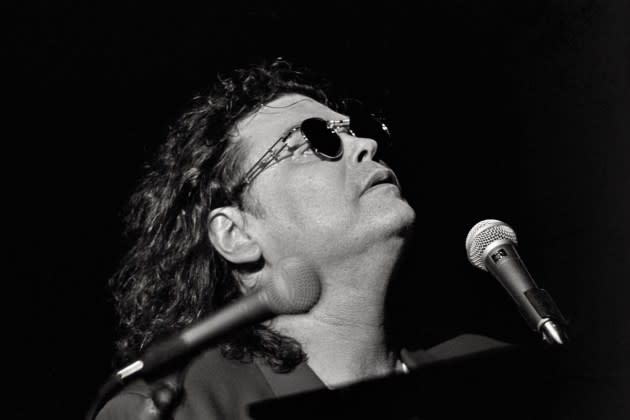Ronnie Milsap Says Goodbye
- Oops!Something went wrong.Please try again later.

Ronnie Milsap will play his final Nashville concert Tuesday night, a guest-heavy salute to the piano player featuring Kelly Clarkson, Little Big Town, Sara Evans, Parker McCollum, Breland, Ricky Skaggs, and more. Milsap is 80 now and regarded as a pillar of country music — the Country Music Hall of Fame inducted him in 2014 — but at heart, he remains an unapologetic pop vocalist.
Listen to “Pure Love,” his 1974 Number One hit, written by Eddie Rabbitt. Only an expert in pop could successfully sell those lyrics about “milk and honey and Cap’n Crunch/And you in the morning.” Or try 1982’s “Any Day Now,” his definitive rendering of the Burt Bacharach love song. Even Milsap’s entry in country music’s truck-driving canon, 1984’s “Prisoner of the Highway,” is polished as brightly as chrome.
More from Rolling Stone
See Ronnie Milsap, Dolly Parton's Animated Video for 'Smoky Mountain Rain'
Watch Ronnie Milsap, Little Big Town Sing 'Lost in the Fifties Tonight' on 'Fallon'
Ronnie Milsap and Kacey Musgraves: In the Studio for Their Stunning Duet
Those same pop leanings and his reputation as a rock & roller threatened to derail Milsap before he even began. Just before he signed in 1973 to RCA, the label where he’d spend the bulk of his career, Milsap was nearly dismissed by the legendary Jerry Bradley, then head of the label. “Jerry Bradley said, ‘I know about Ronnie Milsap. He’s in Memphis and he does R&B, rock & roll. Does he really sing country?’” Milsap recalls to Rolling Stone. “So they played him a song of mine called ‘That Girl Who Waits on Tables.’ And Jerry said, ‘That sumbitch can sing country!’”
That profane revelation launched a music career that painted well outside the lines of the genre and resulted in both country and adult contemporary hit singles. Without Milsap, the country-pop crossover doesn’t happen as readily as it has, if at all. There’s possibly no Dan + Shay, no Rascal Flatts, no Lady A. Even the mainstream appeal of Luke Bryan or Kacey Musgraves, both of whom paid homage to Milsap on his 2019 album The Duets, might not be as much of a sure thing without the example he set years earlier.
Milsap was so adept at pop and comfortable with the idea of courting an outside-of-Nashville audience that his 1984 video for “She Loves My Car,” starring a then-unknown Mariska Hargitay and featuring a cameo by Fantasy Island‘s Hervé Villechaize, got a premiere on MTV. “The first time that video was played was on MTV,” says Milsap, who almost bailed on the shoot until he caught hell from an executive. “He said, ‘I’m spending a couple hundred thousand dollars on this video. And I’ll never be able to get these people back together again. Are you going to do the video for me or not?’” (The end result was a neon assault on the senses that makes you think that maybe Milsap should have stuck to his guns.)
But the other joy of Milsap is that he’s never been afraid to throw himself headlong into the stunt. He titled his 1976 album 20/20 Vision — Milsap, of course, was born blind. “I’ve got 20/20 vision,” Milsap laughs, quoting the lyrics, “but only looking back.”
Onstage at Nashville’s Bridgestone Arena, he’ll be doing a lot of that, reflecting on the work he put in to build a legacy in both country and pop.
“I didn’t just come into town and start having hit records. You’ve got to study the songs and see if it’s a song that you really want to do,” Milsap says. “And I guess some of them crossed over. Sometimes that just happens.”
Ed. Note: This interview was conducted by Stephen L. Betts in August.
Best of Rolling Stone
